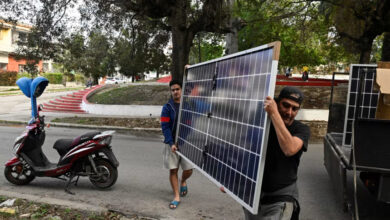Syrian troops backed by tanks deployed in a border village on Thursday, witnesses said, ignoring growing pressure from Washington, which imposed sanctions on President Bashar al-Assad for rights abuses.
From the Lebanese village of Boqaya, Syrian soldiers could be seen across the border deploying along a stream in Arida village and entering homes. Lebanese soldiers also fanned out across their side of the frontier.
Earlier, sporadic gunfire and shelling were heard coming from the village. Arida is near the town of Tel Kelakh, which Syrian troops entered on Saturday, killing at least 27 civilians, according to one rights activist.
Syrian security forces have used tanks, gunfire and mass arrests to crack down on flashpoints in an attempt to crush a two-month-old revolt against four decades of authoritarian rule by the Assad family. Bashar himself has ruled for 11 years.
Western powers, fearing instability across the Middle East if Syria underwent a dramatic upheaval, at first made only muted criticisms of Assad's actions, but then stepped up their condemnation and imposed sanctions on leading Syrian figures.
Washington's decision to target Assad personally poses questions about whether the West may ultimately seek his overthrow, raising the stakes in a conflict that human rights groups say has cost the lives of at least 700 civilians.
Damascus condemned the sanctions, saying they targeted the Syrian people and served Israel's interests.
"The sanctions have not and will not affect Syria's independent will," an official source was quoted as saying on state television.
"Any act of aggression against Syria is an American contribution to Israeli aggression against Syria and Arabs."
A senior US official said the new sanctions were meant to force Assad to carry out promised political reforms.
"President Assad has a clear choice: either to lead this transition to democracy or to leave," the official, speaking on condition of anonymity, told reporters.
Leading Syrian opposition figure Haitham al-Maleh said the decision meant "members of the regime are now under siege."
The US Treasury Department said it would freeze any assets owned by Syrian officials that fell within US jurisdiction, and bar US individuals and companies from dealing with them.
The sanctions also include Syria's vice president, prime minister, interior and defense ministers, the head of military intelligence and director of the political security branch.
Treasury official David S. Cohen said the move sent a clear message to Assad and his inner circle that "they will be held accountable for the ongoing violence and repression," but it was unclear which assets, if any, would be blocked.
An EU diplomat said the European Union was also likely to extend its sanctions on Syria next week to include Assad.
The unrest in Syria began in March when protesters, inspired by uprisings in other parts of the Arab world, took to the streets calling for greater freedoms and an end to corruption.
As Assad made some token gestures toward reforms, including lifting a decades-old emergency law, the crackdown by troops, security forces and irregular Assad loyalists intensified.
Many activists and protesters now say it is too late for reforms and are calling for the overthrow of Assad. But the 45-year old president has shown no sign of allowing Western pressure to deter him from crushing popular dissent.
Syrian authorities blame most of the violence on armed groups backed by Islamists and outside powers who they say have killed more than 120 soldiers and police.
Switzerland said it would impose travel bans on 13 top Syrian officials not including Assad, and freeze any of their assets held in Swiss banks, matching a decision by the EU.
Amnesty International welcomed Washington's move and called on US President Barack Obama, who was due to give a speech on Thursday about the Arab uprisings, to impose an arms embargo.
"President al-Assad and those around him must be held individually criminally responsible before the ICC (International Criminal Court) or national courts of states exercising universal jurisdiction," said Amnesty's T. Kumar.
Syria has excluded most international journalists, making it hard to verify reports from activists and officials.




